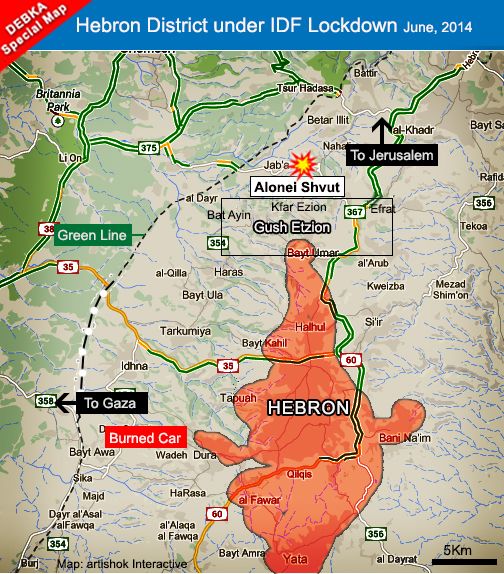Will Netanyahu use boys’ rescue operation to finally thrash Hamas in Gaza too?
Signs of an approaching IDF military operation against Hamas abounded this week as a possible outcome of the massive military-cum-intelligence effort to rescue the three Israeli boys Hamas is accused of abducting near Hebron on June 10. Military strength constantly poured in to reinforce the siege around the Hebron, a West Bank city of 170,000 and is environs. Sunday night, June 15, Israeli forces surrounded and then stormed two houses for suspects, after detaining up to 100 Hamas operatives.
During the day, a limited call-up of reserves was announced.
All in all, it looked as though the fundamentalist Islamic organization was in for a major smack – and not only in Hebron. Opposite Hamas’ Gaza base, Israel deployed Iron Dome missile interceptors at important towns within range of Palestinian rockets – Ashdod, Beersheba and Rehovot as well as Ashkelon, where Sunday night, the battery caught two missiles incoming from the Gaza Strip.
Israel and Egypt had meanwhile shut down their border crossings to and from the Gaza Strip. The Egyptian army also beefed up its deployment along the Israeli border and posted an armored battalion at the Sinai terminal at Taba.
Hamas has avoided admitting to the abduction or making any demands. Pent-up Israeli fury against its constant menace and routine extortions is fueled by the anguish of the teenagers' families. The government would find it hard in the current environment to bow to yet another demand to hand over Palestinian prisoners. Dealing with Hamas in military terms is backed across the political spectrum under popular pressure.
This confrontation may blow quickly from the West Bank to the Gaza sector. There, Hamas holds its vast missile arsenal and terrorist infrastructure, which it has refused to relinquish even for the sake of Palestinian reconciliation and a unity government, and will use it to the full to terrorize southern and central Israeli cities and villages.
There, too, Hamas could count on backup from the pro-Iranian Palestinian Jihad Islami, which has accumulated firepower that rivals that of Hamas as well as a strong foothold in West Bank refugee camps.
IDF Chief of Staff Lt. Gen. Benny Gantz, in his brief comment Saturday night, June 14, made an important point when he said: “While bending all our efforts to rescuing the three boys, we are keeping a watchful eye on the north and the south.”
He has clearly taken into account that in a conflagration with the Palestinians, Hizballah units in Lebanon and Syria, including the Golan border, may well open a second and third front against Israel to ease the pressure off its allies.
All these calculations weigh heavily on Prime Minister Binyamin Netanyahu, Defense Minister Moshe Ya’alon, Lt. Gen. Gantz and his deputy Maj. Gen. Gady Eisenkott in deciding on the scale and targets of military action against Hamas, which may have started rolling. It has been given a name: “Our Brothers Come Home.”
The Egyptian military concentrations on the Israeli and Gaza borders attest to a degree of coordination between Jerusalem and Cairo, under former army chief President Abdul Fattah El-Sisi.
On the one hand, El Sisi Israel’s leaders are of the same mind as Israel on the pressing need to keep Hamas and some of its Al Qaeda allies in Sinai from using the peninsula as their launching- pad for cross-border attacks on Israel.
On the other, the Egyptian president will not readily commit himself to supporting an Israeli military operation to destroy the military resources of the Muslim Brotherhood’s ally and offspring in Gaza, without first obtaining the nod of Saudi Arabia and the Gulf Emirates, which bankroll his regime and armed forces.
Netanyahu appears to be holding his fire in the hope of a positive reply from Cairo before approaching Washington for its blessing.
In the meantime, other punitive measures are to be broached, such as a proposal to declare null and void the much-criticized 2011 deal which traded a thousand convicted Palestinian terrorists, including mass murderers, for Gilead Shalit, the soldier held hostage by Hamas for five years..Another is to deport Hamas leaders from the West Bank to the Gaza Strip.
The Netanyahu government and Obama administration have attained a limited area of assent in recent months over Israel’s role in the Syrian civil war. It is based on the understanding that Jerusalem will give Washington advance notice of its military steps without the obligation to comply with the administration’s position.
Would this informal US-Israeli arrangement work for an operation against Hamas? Would the Obama administration abstain from supporting this Israeli initiative in the war on terror?
Israel is mulling its strategic options not too far away from the sights and sounds of ISIS (Islamic State for Iraq and the Levant) feats in conquering one city after another in Iraq’s Sunni heartland – and its backlash: Although the Iraqi national army claims to be pushing back, it is in reality thousands of Iranian Al Qods Brigades troops who have take ISIS on.
If Tehran succeeds in stabilizing the Shiite Prime Minister Nuri al-Maliki’s government and saving his army from collapse, just as it did for Syria’s Bashar Assad, that success would consolidate Hizballah's strength in Lebanon and Syria and that of Hamas and Jihad Islami in Gaza City and Ramallah.
The two terrorist organizations would rule the roost in the Palestinian governing administration.
Although this process may take some months to unfold, Netanyahu would be advised to act soon to nip it in the bud before radical rule in Hebron and Gaza is transposed to Ramallah.
In 2012, Netanyahu stepped back from finishing the IDF operation against Hamas’ rocket blitz without putting paid to the threat. Two years later, he vowed there would be “grave consequences” for the abduction of three teenage Israeli civilians. Will he make good this time on his strong words against Hamas?



